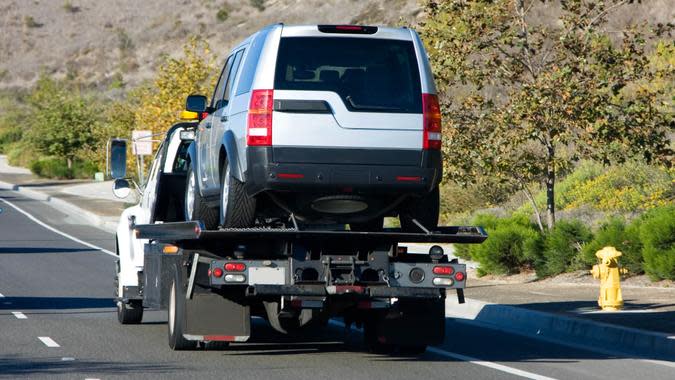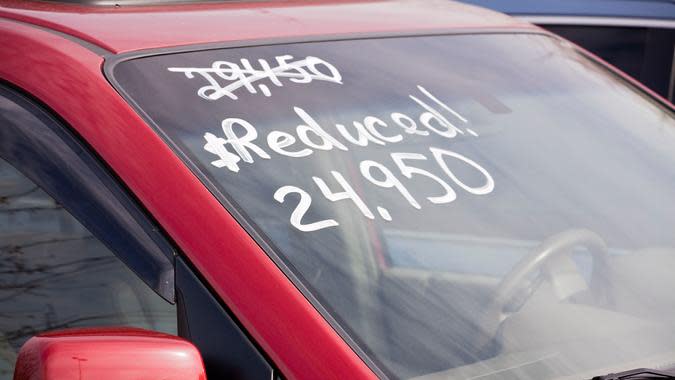What To Do If Your Car Is Repossessed

When you signed the financing agreement that enabled you to buy a car on payments, you made a legally binding promise to make those payments on time every month. If you miss a single payment by 30 days — or certainly three payments over 90 days — your lender can send someone to physically come and take that car back.
Read More: 17 Hidden Auto Costs Your Dealer Will Never Tell You About
Discover: 25 Things You Should Always Do Before Buying a Used Car
That’s repossession. It’s one of the worst feelings in the world, but if it happens to you, you have to act fast — or even better, prevent it in the first place. Beware of the hidden costs of taking out an auto loan.
Last updated: Oct. 26, 2021

Know the Law
The process of repossession is intrusive and frustrating and can be intimidating. The laws are murky and vary from state to state, but a court order is almost never needed for a lender to issue a repossession order, and they don’t have to notify you beforehand. In most cases, repo agents can come onto your property but can’t enter a secure structure, meaning they can take a car from a driveway but not from a closed garage. They’re never allowed to breach the peace or make threats. If you’re worried that the repo man is in your future, learn the law in your state.
Read: The Best and the Worst Time of the Year To Buy a New Car

Don’t Fight
Just as repossessions can be intrusive, frustrating and intimidating, they can also be infuriating. Watching a stranger come onto your property and hook your car up to a tow truck might compel you to scream, yell or run out of your house and confront the person. Don’t. Just as repo agents are not allowed to breach the peace or make threats, neither are you.
Read: 26 Smartest Ways To Invest Your Money Right Now

Call the Police If You’re Uncomfortable
If you believe the repo agents have overstepped their bounds, intruded on your property inappropriately, broken the law or are simply in the wrong, call the police. The police are not in the business of helping repo agents secure vehicles, but they will keep the peace and inform both parties of their rights.
See: 30 Greatest Threats to Your Retirement

Don’t Hide Your Car
If you catch wind that you’ve been marked for repossession, you might be tempted to lock your car in your garage or otherwise hide it — this is almost always a bad idea. First of all, it’s usually illegal to intentionally hide your car to dodge rightful repossession. Second, your lender can obtain a court order called replevin to find and seize your car where it’s hidden. Third, the harder you make things, the more the repo company will charge the lender — and the lender and the law will hold you accountable for those costs.
Find Out: Hidden Obstacles That Keep People From Retirement

Ask How To Reclaim Your Stuff Inside
The repo agent has the right to take your car, but the personal items inside are yours. In some cases, you’ll receive an inventory of personal items with instructions on how to retrieve them. In other cases, the repo man might let you collect your belongings right there. Keep in mind that personal items don’t include aftermarket add-ons like new stereo systems.

Contact Your Lender
The moment the tow truck hauls your car away, the clock starts ticking. Call your lender immediately. It’s rare, but they could have made a mistake. If your car was truly the one they were after, the repo agent will contact them immediately to let the lender know they’ve secured the vehicle, and your lender will begin taking steps to proceed. Every minute you wait gives the lender more time to put a plan into action.
Upgrade: 23 Car Upgrades That Are Worth the Price

Ask Why Your Car Was Repossessed
The first question to ask is why the car was repossessed. You probably already know — in the vast majority of cases, cars are repossessed because their owners missed payments, a fact that’s likely not lost on you. In some rarer cases, however, something more benign — like letting your insurance policy slip — might have triggered an automatic repo.

Ask If You Can Get Your Car Back
When your car has been repossessed, you’ll naturally want to know if you can get it back. The answer is, it depends on your lender, on where you live and on your specific situation. Your lender might have a policy in place that makes it possible for you to get your car back. Your state might have consumer protection laws that allow you to redeem your vehicle. Either way, you’ll almost always have to pay outstanding balances, repossession and storage fees, and other associated costs.

Find Out If You Live In a Right of Redemption State
Many states have “right of redemption” laws that require lenders to allow you to reclaim your car. The catch is that redemption requires you to pay the entire balance on your loan, including arrears on the payments you missed and all costs associated with repossession and storage. It’s unlikely that people who couldn’t keep up with monthly payments are going to be able to come up with the cash for post-repo redemption.

Ask Your Lender To Reinstate the Loan
If you’re able and willing to pay the loan’s arrears and all the affiliated costs, but not the outstanding balance of the loan, your lender might be willing to reinstate the loan, which is different than redemption. You would essentially pay the back balance and go back to where you started with the loan. Your state might have laws giving you the right to reinstate or reinstatement protection might have been written into your loan. Either way, the lender has to inform you in writing if you have the right to reinstate and, if so, to give you an associated quote. As with redemption, time is of the essence with reinstatement, and you’ll have to get in good standing within a certain time period.

Know That You Might Be Monitored
If you do have the right to reinstate your loan, or if you can convince your lender to reinstate it even if you don’t have the right, reinstatement might come with a stipulation. Depending on where you live, your lender might have the right to attach an electronic disabling device that prevents your car from starting if you miss a payment in the future.

Ask the Lender If They Plan To Sell Your Car
After repossession, the lender might keep the car as compensation, but if you’re not able to redeem or reinstate, it’s much more likely that they’ll sell it to try to recoup some of their losses. Some states require lenders to tell you if they’re going to sell the car, and if that sale is a public auction, when and where it’s going to take place. Others do not, but it’s always a good idea to ask so you can know what is in store for your car’s future.

Understand How You Can Buy Your Car Back at Auction
If the lender is planning to sell your car, they’ll likely sell it at a public auction. You, like any other member of the public, have the right to bid on your car — and you might get a great deal. People go to auctions because organizations like police agencies and lenders want to get whatever they can for the cars they’re auctioning. In reality, however, if you couldn’t keep up with monthly payments, you likely won’t have the cash to buy it back in full.

Consider Bankruptcy
If all else fails, filing for bankruptcy before the lender sells your car will automatically halt the sale. Once you’re in bankruptcy proceedings, the lender will have to obtain a court order to go ahead with the sale. It might buy you time to gather the money to redeem your car, but bankruptcy comes with devastating effects on your credit and strict legal consequences that dictate what you can and cannot do for years to come. Also, it might not work as the lender can secure a court order to sell your car anyway.
Prepare Now: 20 Questions You Need To Ask Your Car Dealer Before You Buy

Be Aware You Might Still Owe Money
It’s important to understand that even if your car gets repossessed, it’s likely that you’ll still owe the lender money. If you owe $12,000 on the loan, for example, and the lender sells your repossessed car for $8,000, the $4,000 difference — as well as any associated fees and costs — are called the deficiency, which you’ll get a bill for.

Be Prepared For Your Lender to Possibly Sue You
Most states allow lenders to sue you for deficiency payments if you don’t agree to pay them on your own. You might be able to defend against a deficiency judgment if your lender waited too long to sue you, if they breached the peace or otherwise improperly repossessed your car.

Don't Expect To Get Money Back — Although It Could Happen
The opposite of deficiency is surplus. If the lender sells the car and has money left over after satisfying the balance and paying all associated costs and fees, they’re required to notify you and pay you any surplus funds. Don’t hold your breath for this — surplus situations are incredibly rare.

Understand That Banks Don't Prefer Repossession
Banks make money by financing loans, not from paying contractors to repo cars and then selling them at a loss. Cars depreciate in value quickly and dramatically. Repossession cases require expensive legal work, selling cars costs money, and lenders are likely never to receive full deficiency payments even through court orders. This reality gives you a lot of leverage if you get into trouble — but only if you’re proactive before the repossession takes place.

What You Should Do To Avoid Repossession in the Future
Despite all the previously discussed measures, the truth is that it’s very hard to get your car back once it’s repossessed — your lender will almost always prefer to get whatever they can for the car and be done with you. If you are able to get it back, it’s always expensive. It’s very likely, however, that you can prevent a repossession, and it’s certain that preventing a repossession is easier and more likely than dealing with the mess after your car gets hauled away.
Keep reading to find out what you should do if you're struggling to pay for your car.

Communicate Before You Miss a Payment
If you’re sure you can’t make the next month’s payment, the worst thing you can do is nothing. Just by reaching out to your lender, you’re making a statement that you’re being proactive, that you’re not just going to stop answering the phone and disappear into the wind, and that you’re a borrower worth working with. You’re far from the only person having trouble keeping up with payments. They might offer to let you defer on or even skip a payment or work out some other solution with you — but only if you take action before you miss a payment.

Know That a Single Missed Payment Is All It Takes
Most states allow lenders to repossess cars as soon as the loan goes into default — that includes missing just a single monthly payment. It’s important to note, however, that default doesn’t occur when you pay past your due date. In all states, you have a full 30 days to make a payment, although you’ll probably incur a late payment fee for doing so. After a month, however, you and your car are usually fair game.

In Reality, Repossession Will Probably Take Longer
As previously stated, banks don’t want to repossess cars, they want to collect interest on loans. Most lenders will wait until a loan moves from default to delinquency. That’s usually three missed payments or 90 days before they issue repossession orders. If you’re in a financial bind, however, you shouldn’t assume you have three months to figure things out.

Take It Seriously
Defaulting on a payment or worse, allowing an account to go into delinquency, are terrible for your credit, as is having a car repossessed. The consequences are real and lasting. It creates a vicious cycle that, once set into motion, is hard to stop: You miss payments because you’re struggling with money. Your car gets repossessed, which makes it even harder to earn money. The missed payments and repossession sink your credit, which makes it nearly impossible to finance a new car, and the cycle goes on and on — for years or even decades.

Renegotiate Your Loan
If your financial problems are bigger than a single missed payment, you might want to consider working with your lender to extend the term of your loan. You’re not asking for a favor. You benefit in the form of lower monthly payments and the lender benefits by stringing out the loan, which means collecting more interest for more years — plus they don’t have to deal with the headache of repossession.

Consolidate Your Debt
If you’re struggling with car payments, you’re probably struggling across the board. By consolidating your debt, you can wrap all your unsecured payments into a single loan at a lower interest rate than what you’re paying your credit card companies, thereby freeing up funds to make your car payments. Look into personal loans designed for debt consolidation or opening a balance-transfer credit card account. The latter option buys you some time by transferring your existing high-interest credit card debt to a new card with a low- or no-interest introductory rate.
More From GOBankingRates
This article originally appeared on GOBankingRates.com: What To Do If Your Car Is Repossessed

 Yahoo Finance
Yahoo Finance